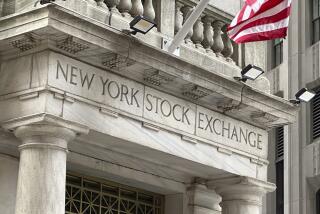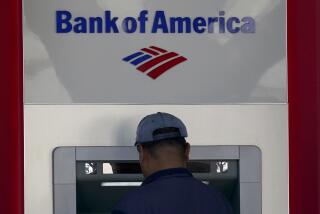New losses drag down bank stocks
- Share via
NEW YORK AND LOS ANGELES — Two of the country’s biggest banks spilled billions of dollars in fresh red ink Friday, prompting further erosion of stock prices in the financial sector.
Bank of America Corp. reported a $2.6-billion quarterly loss, marking its first loss in 18 years. The company also practically eliminated its dividend, as required by the latest federal aid package announced Thursday night by the government that includes a new $20-billion capital infusion.
Citigroup Inc. posted an $8.3-billion loss for the quarter and said it eventually planned to sell or spin off much of the company beyond its traditional banking business and investment bank.
The ugly results underscore the depth of the problems plaguing the industry, said Jeff Arricale, manager of the T. Rowe Price Financial Services mutual fund.
“The U.S. banking system is on life support,” he said. “Things are bad and haven’t bottomed yet.”
Bank of America’s stock tumbled 14% on the news, while Citigroup’s sank 8.6%. An index of bank stocks slid 4.1%, giving it a loss of 21% for the week.
Last fall, Bank of America seemed to be weathering the worst economic storm since the Depression. It was paying a hefty 64-cent-per-share quarterly dividend, and it agreed to buy New York-based brokerage giant Merrill Lynch & Co., rescuing it from what appeared to be likely failure.
In October, the Charlotte, N.C., bank said it didn’t need its first $25-billion infusion from the government -- including $10 billion allocated to Merrill -- but accepted it nonetheless.
But Friday the company cut its dividend to a penny a share as a condition of its second federal infusion of capital. As part of the aid package, the Federal Deposit Insurance Corp. agreed to share losses on $118 billion of toxic assets held by the company, most of them taken on when the Merrill Lynch deal closed Jan. 1.
BofA Chairman Kenneth D. Lewis said the government stepped in this week because Merrill’s condition had deteriorated drastically in the last four months. The company said the brokerage lost $15.3 billion in the fourth quarter, before its books were meshed with Bank of America’s.
The FDIC determined that not helping Bank of America “would have significant and systemic effects on the broader economy,” said agency spokesman Andrew Gray.
Such a determination, the only way the FDIC can assist open banks, requires approval from the Federal Reserve and the Treasury secretary in consultation with the president, Gray said.
In addition to slashing its dividend, Bank of America will have to submit its executive pay decisions for government approval. The bank earlier this month said it wouldn’t pay bonuses for 2008 to Lewis or other top executives.
As a fee for the loss-sharing arrangement, Bank of America agreed to give the Treasury and the FDIC an additional $4 billion of preferred stock paying an 8% dividend.
Citigroup said it planned to shed its CitiFinancial consumer-finance unit and its Primerica insurance business. This week Citi said it was putting its vaunted Smith Barney brokerage in a joint venture to be controlled by rival Morgan Stanley.
The moves amount to the most drastic attempt yet by the beleaguered banking giant to stem losses that totaled $18.7 billion last year and more than $28 billion in the last five quarters. The company is essentially abandoning its longtime “financial supermarket” strategy of providing virtually every financial service imaginable under one roof.
“Our results released this morning are clearly disappointing, and I can assure you that my No. 1 priority is to return this company to profitability,” said Vikram Pandit, Citigroup’s chief executive, in a conference call with analysts.
“It’s hard for people who are not here to truly understand the magnitude of change we’ve gone through,” Pandit said.
Critics had long derided the financial supermarket concept as unworkable, saying customers wouldn’t necessarily buy insurance or brokerage services from their banker, and complained that the company had grown too unwieldy to manage properly.
“They’re rationalizing the size of the company and putting resources where resources should go and getting rid of things that just don’t fit well with the rest of the pieces,” said Anton Schutz, a money manager specializing in financial stocks.
Pandit promised that Citigroup would return to profitability this year and be in the black for the year as a whole.
But the company still faces daunting obstacles, starting with the crippled economy that is causing vicious loan losses throughout the banking industry.
Beyond that, it’s unclear whether Citigroup can find buyers or fetch reasonable prices for the businesses it hopes to unload. There also are questions about how profitable a more risk-averse Citigroup will be.
As word of the restructuring leaked out this week, some critics said that it didn’t go far enough and that Citigroup would have to rend itself apart further.
--
scott.reckard@latimes.com
More to Read
Inside the business of entertainment
The Wide Shot brings you news, analysis and insights on everything from streaming wars to production — and what it all means for the future.
You may occasionally receive promotional content from the Los Angeles Times.











